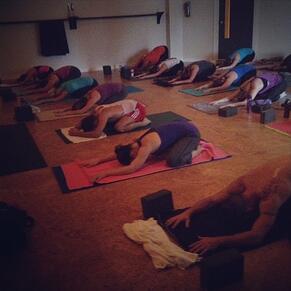The Best Time of Day to Practice Yoga Is...
 Many schools of Yoga insist that the best time of day for practice is in the early morning. While that tradition is recognized and adhered to strictly by some practitioners, most people I know choose to build yoga into their day and not build their day around it.
Many schools of Yoga insist that the best time of day for practice is in the early morning. While that tradition is recognized and adhered to strictly by some practitioners, most people I know choose to build yoga into their day and not build their day around it.
Today I want open up the conversation about practice, tradition and what is realistic for your life.
Morning Yoga: Pros
In Chinese Medicine, when we wake in the morning the energetic state is that of Yin transitioning into Yang (What the heck is Yin and Yang? Click here).
As the sun rises and warms the earth, Yang energy grows. Many people find that mid/late morning is a productive time, as Yang energy soars toward its peak for the day. From this energetic standpoint, in order to help usher in the new day one might feel strongly compelled to practice Yoga in the morning.
It makes perfect sense in terms of synergy. As the world slowly wakes, you wake the body making early mornings a natural choice as the ideal practice time if you use your practice to transition out Yin into the arms of a new day full of Yang energy.
And on a practical note, morning practice means you don’t have to try to find time later on.
However...
Morning Yoga: Cons
As someone who used to have a fairly strict morning practice, I can also say that the body rarely feels as open or as “good” during an AM practice as it does later in the day.
For many people, the morning is rushed.
Or you are so groggy that not only is it hard to get motivatated on the mat, but you may not take special care to get warm enough. If you do practice when you aren’t warm, open and awake enough to pay close attention to what is happening, there is more potential for injury.
Do not misunderstand me, I am not one for yoga fear mongering, but it is important to keep in mind that if you aren’t a morning person then it will be more difficult stay present with the body and breath.
This is true at any time of day.
If you aren’t attentive it makes you more vulnerable- plain and simple. Another pseudo-con to Morning practice is that you can’t be both a night owl and an AM yogi.
If you don’t like having dinner at 4:30pm and have a social life that happens after dark, early morning yoga might not be your thing.
Afternoon/Evening Practice: Pros
I won’t lie, although I know Yoga doesn’t need to feel “good” to be effective, an afternoon or evening practice feels about a billion times better than a morning one to me. My body has had time to move around all day by then and my brain is online and functioning...mostly.
I love a good late day practice because it also splits up the day. For many of yogis this is a big deal. We have to consciously choose to step out of the stream of the day to get the body moving after hours of work (probably sitting in a chair for hours). This shift in activity can also be very beneficial to assist in lowering stress levels and changing our mental state.
Rather than sit and ruminate about something a co-worker said or freak out over some problem, yoga offers a mental and physical break and the opportunity to remind yourself how powerful a mere shift in perspective can be.
The yoga class becomes a sanctuary, holding exactly the space you need to dissolve the drama of whatever was previously looming over your head.
Another major benefit to practicing later in the day is that you have had a chance to fuel yourself with healthy food and hydrate appropriately. Eating right before yoga is considered a no-no (it is very unpleasant to be upside down with a belly full of food).
When morning yoga was my practice exclusively, it was a two hour (minimum) affair and sometimes I would have to cut things short because I was so hungry I couldn’t keep going. Although the purists say that yoga on a completely empty Stomach is the way to get the digestive fires going, all it did for me was cause me to develop a massive Spleen and Liver imbalance.
Even if you don’t get the Chinese medicine reference, it would be like someone doing a two-hour intense workout 3-5 days a week and only drinking a bit of water (and maybe a piece of fruit) beforehand. It would be unwise to do such a thing and also improbable that anyone could perform optimally without proper nutrients.
Afternoon/ Evening Cons
The biggest downside to an afternoon practice is the flip side to one of the benefits I listed earlier.
It is challenging for many people to step out of the stream of the day after things get rolling. There are so many things pulling for your time and attention on top of work, family, friends and other projects you might want to complete.
It can be difficult to drop whatever you are doing and while it may be an important discipline to learn, if people in your life don’t understand what you are up to, they might not understand why you miss dinner with the family every other night to go to a yoga class.
Another possible downside to a later practice is that if you are doing a practice designed to stoke the fires of Yang it may disrupt your sleep schedule (Try this Yoga routine before bed to help instead).
In the end, the best time of day to practice is whatever time works in your life.
Someone once said to me that doing a little bit of Yoga is 100% better than no Yoga at all. In an ideal world, we would all have the time and energy to practice according to a regulated schedule as well as the time to rest.
For now I encourage you to simply experiment and find the time that works best for you in your lifestyle.




